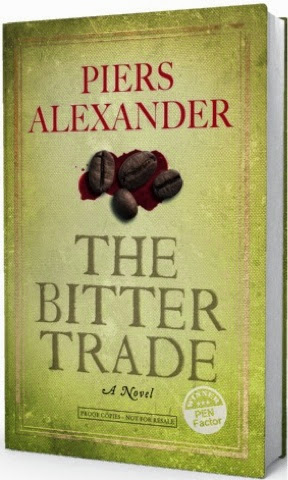Piers is a serial entrepreneur. After a successful career as CEO of media and events companies he became a Co-Founder and Chairman of three start-up businesses. In 2013 he was awarded the PEN Factor Prize for THE BITTER TRADE. He is currently working on the sequel, Cimarron,set in Jamaica in 1692.
Piers is a coffeehead and bookworm who has travelled extensively and spends long happy hours at the London Library buried in books on seventeenth century history. He is particularly interested in the lives of women in history. He is married to the singer-songwriter and author Rebecca Promitzer and lives in London.
Coffee, Books and Scandal: A Literary History of Coffeehouses
Guest post for The Reading Life
Piers Alexander
THE Coffe-house Trade is the best in the Town; |
Young sparks that have money they thither repair: |
The Affairs of the Nation they have written down, |
To blow up their Noddles as light as the Air. |
Stories, Stories, Lies and Stories; |
There's nothing but Stories when they begin. |
Pox on your News Letters, they lye both and flatters; |
They are but a Trap to wheedle Men in. |
From The City Cheat discovered: OR, A New Coffe-house Song.
Perswading all civil and sober Men not to frequent the Coffe-houses so much
While researching The Bitter Trade, my novel set in England’s Glorious Revolution of 1688, I became fascinated with the role of coffeehouses in disrupting the pattern of society, thought and commerce. I like stories about underdogs and outsiders, and London in the late seventeenth century was one of rare places when people could rise up through society if their wits were sharp and their spirits bold. The coffeehouses were central to this: unlicensed, threatening to the establishment, independent-minded.
Coffeehouses have been hotbeds of writing, commerce and sedition since the bean first came to England in the mid-seventeenth century. Men would exchange news, gossip and lies with complete strangers; declaim poetry out loud; even sing rude “broadside ballads” in groups.
Coffeehouses themselves encouraged this exchange of words, including newspapers and pamphlets in their admission charges.
One of the first literary coffeehouses was Will’s of Covent Garden, where John Dryden held court, and where Samuel Pepys was a regular, even during the plague and great fire. Conversation ranged from the academic – debating whether Paradise Lost should have been written in rhyme – to the scurrilous, delving into lampoons and libels.
In the Tatler, Richard Steele remembered it as a place “where you used to see songs, epigrams and satires in the hands of every man you met…”
Jonathan Swift was dismissive, saying that “the worst conversation I ever remember to have heard in my life was that at Will’s Coffeehouse, where the wits (as they were called) used formerly to assemble… and entertained each other with their trifling composure in so important an air, as if they had been the noblest efforts of human nature, or that the fate of kingdoms depended on them.”
In turn, Swift and his “knot of Wits”, including Alexander Pope and Joseph Addison, used to meet at Button’s coffeehouse in the early eighteenth century, with a mission to open men’s minds to literature and raise the standard of discourse.
By 1754, the wits of London had moved to the Bedford Coffee-house in Covent Garden: John and Henry Fielding, Hogarth, Oliver Goldsmith and David Garrick among them. The first number of The Connoisseur reported that the Bedford 'is every night crowded with men of parts. Almost everyone you meet is a polite scholar and a wit. Jokes and bon mots are echoed from box to box; every branch of literature is critically examined, and the merit of every production of the press, or performance at the theatres, weighed and determined.'
Coffeehouses were the Internet and social media of their day: unregulated, endlessly creative, swooping from high principles to low scandal and back again. I recently attended the London Coffee Festival: over twenty thousand bloggers, hipsters and freethinkers crammed into a small hall in Spitalfields over a weekend, attracted to the buzz and creativity of today’s independent coffeehouse movement.
There’s something about the drug itself that feeds the imagination and frees the mind from convention. If you follow the trail of coffee back through the Ottoman Empire to its roots, you’ll find a mild drug used by Yemeni mystics to access the divine. I think it’s no accident that independent coffeehouses are frequented by troublemakers, writers, app developers and trendsetters: coffee is a creative irritant. Brewed properly, it disturbs conventional thinking, brings strangers together, turns its back on consumerism and allows artists and revolutionaries to spend hours huddled over a little table for a tiny fee. If you Google “coffee and books” as a phrase you will find 23 million results.
Of course, too much coffee distracts the mind. NASA’s famous 1995 experiment on spiders showed how this highly creative beast can be distracted by caffeine.
Perhaps this is why gossip and salacious scandal have always followed literary ideals round the coffeehouses of the world. The first cup awakens; the third cup trivialises. As the song says above: you can blow up your noddle if you aren’t careful.
Piers Alexander is the author of The Bitter Trade, a novel of coffee racketeering and treason during England’s Glorious Revolution of 1688
The Bitter Trade is available on all ebook stores and as a paperback from Amazon
http://www.amazon.co.uk/s/ref=nb_sb_noss_1?url=search-alias%3Daps&field-keywords=The+Bitter+Trade
End
This post is protected under international copyright laws and cannot be reproduced in any fashion without the approval of the author.
I offer my great thanks to Piers for this guest post












No comments:
Post a Comment